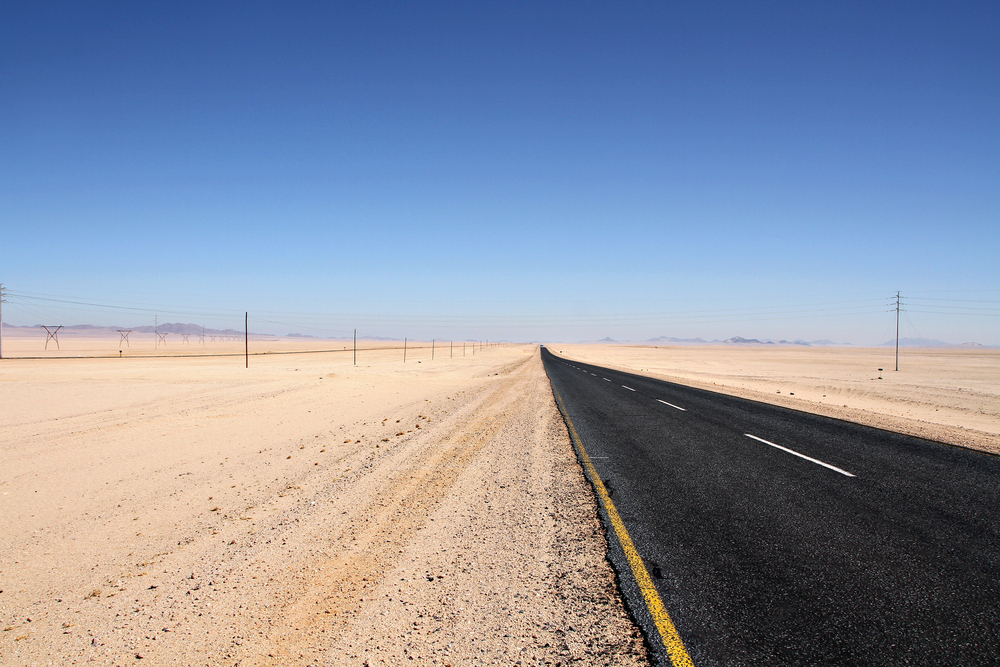Whether you’re driving your car down the highway or preparing for takeoff in a plane, you likely don’t pay much attention to the black stuff on the ground that makes it easier for you to get from point A to point B. After all, black stuff is black stuff, and to the untrained eye, there’s not much difference between an airport runway and the street outside your house. However, each is made with a unique material and process that serves a specific purpose. The minute differences between asphalt and tarmac determine the effectiveness of the road or lot, so if repaving is in your future, it helps to know which material can best serve your needs.
Tarmac
When riding in an airplane, you’ll likely spend quite a bit of time on the runway waiting for takeoff. Getting stuck on the tarmac is perhaps one of the most frustrating parts of air travel nowadays, but at least you can trust that once you get moving again, the tarmac will offer you a smooth, seamless transition to the skies.
Tarmac, short for tarmacadam, gets its name from John Loudon McAdam, who first introduced his unique “macadamizing” method in 1820. Macadamizing is a process in which a layer of gravel is adhered to the top of normal pavement, but that isn’t exactly what makes tarmac tarmac.
The “tar-“ part of tarmac comes from the extra layer that a businessman named Edgar Purnell Hooley chose to add to McAdam’s macadamized pavement. As the story goes, Hooley passed a tar factory where he noticed a barrel of the gooey black stuff had tipped over and spilled across the macadamized road. To prevent shoes from sticking in it, the factory had spread gravel on top. This layering of tar and gravel created a sturdy, durable and dust-free roadway. Hooley patented and trademarked “Tarmac” in 1901.
Unfortunately, tarmac is easily damaged by gasoline and diesel fuel, so much of the tar in tarmac today has been replaced with a more resistant material called bitumen, thus creating “bitmac.” Though, after more than one hundred years of calling airport runways “tarmacs,” the name has stuck, tar or no tar.
Asphalt
Bitmac can also go by another name when not on the runways of an airport – asphalt – though the composition of aviation-grade asphalt is a little different than what you’d find on your own street.
Tar is a naturally found substance created from natural resources like wood, peat or coal. Bitumen, on the other hand, is formed from petroleum. Asphalt is made when a blend of small pebbles, stones, sand and other filler are mixed with bitumen as a binding agent. The difference between bitmac and the asphalt you know is simply a matter of the amount of sand and filling agents used in the mixture.
Asphalt is both extremely durable and inexpensive, making it ideal for coating large areas, though it may require more cosmetic cleaning to maintain a pristine appearance. Inclement weather can wear down tarmac quickly, whereas asphalt is resistant to rain, sleet, snow and heat.
In addition to being less expensive to lay down, asphalt is also cheaper to maintain over long periods of time. Reduced occurrences of damage thanks to greater durability means fewer repair jobs in the future. Even better? Broken or damaged asphalt can be recycled or reused in certain situations, further lowering the cost of asphalt overall.
The stuff you may be used to on your driveway, for example, is likely asphalt concrete, a mixture between asphalt and cement that boasts even greater durability and longevity than average asphalt. Unfortunately, asphalt concrete can be sensitive to temperature and may cost more than regular asphalt.
Industrial and Residential Repaving Services in the Seattle, Tacoma, Auburn and Bellevue Areas
Freshly laid, beautiful pavement is one of the little things that makes a home less stressful to maintain or a business more inviting. In addition to a clean appearance, new pavement also provides for a better parking or driving experience for visitors and customers.
Whether your business’s parking lot could use some repairs or your home’s driveway needs a complete repave, the professionals at Lakeridge Paving Co. are here to help. We’ve been paving the roads, driveways and lots of the Seattle, Tacoma, Auburn and Bellevue areas since 1968, so you can trust our pavers are highly-trained and experienced, no matter the job. We pride ourselves on providing reliable, trustworthy service to all our Washington friends, family and neighbors. Contact us online or call 888-403-8290 to receive your quote today!


